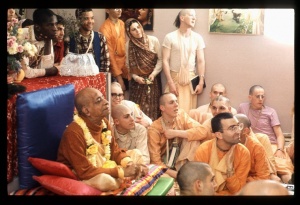SB 7.10.45: Difference between revisions
m (1 revision(s)) |
(Vanibot #0054 edit - transform synonyms into clickable links, which search similar occurrences) |
||
| (One intermediate revision by one other user not shown) | |||
| Line 1: | Line 1: | ||
{{info | {{info | ||
|speaker= | |speaker=Nārada Muni | ||
|listener=King | |listener=King Yudhiṣṭhira | ||
}} | }} | ||
[[Category:Srimad-Bhagavatam - Canto 07 Chapter 10]] | |||
[[Category:Bhagavatam Verses Spoken by Narada Muni - Vanisource|071045]] | |||
<div style="float:left">'''[[Srimad-Bhagavatam]] - [[SB 7|Seventh Canto]] - [[SB 7.10: Prahlada, the Best Among Exalted Devotees|Chapter 10: Prahlāda, the Best Among Exalted Devotees]]'''</div> | |||
<div style="float:right">[[File:Go-previous.png|link=SB 7.10.43-44]] '''[[SB 7.10.43-44]] - [[SB 7.10.46]]''' [[File:Go-next.png|link=SB 7.10.46]]</div> | |||
{{RandomImage}} | |||
==== TEXT 45 ==== | ==== TEXT 45 ==== | ||
<div | <div class="verse"> | ||
dharmo bhāgavatānāṁ ca | :dharmo bhāgavatānāṁ ca | ||
bhagavān yena gamyate | :bhagavān yena gamyate | ||
ākhyāne 'smin samāmnātam | :ākhyāne 'smin samāmnātam | ||
ādhyātmikam aśeṣataḥ | :ādhyātmikam aśeṣataḥ | ||
</div> | </div> | ||
| Line 17: | Line 22: | ||
==== SYNONYMS ==== | ==== SYNONYMS ==== | ||
<div | <div class="synonyms"> | ||
''[//vanipedia.org/wiki/Special:VaniSearch?s=dharmaḥ&tab=syno_o&ds=1 dharmaḥ]'' — religious principles; ''[//vanipedia.org/wiki/Special:VaniSearch?s=bhāgavatānām&tab=syno_o&ds=1 bhāgavatānām]'' — of the devotees; ''[//vanipedia.org/wiki/Special:VaniSearch?s=ca&tab=syno_o&ds=1 ca]'' — and; ''[//vanipedia.org/wiki/Special:VaniSearch?s=bhagavān&tab=syno_o&ds=1 bhagavān]'' — the Supreme Personality of Godhead; ''[//vanipedia.org/wiki/Special:VaniSearch?s=yena&tab=syno_o&ds=1 yena]'' — by which; ''[//vanipedia.org/wiki/Special:VaniSearch?s=gamyate&tab=syno_o&ds=1 gamyate]'' — one can understand; ''[//vanipedia.org/wiki/Special:VaniSearch?s=ākhyāne&tab=syno_o&ds=1 ākhyāne]'' — in the narration; ''[//vanipedia.org/wiki/Special:VaniSearch?s=asmin&tab=syno_o&ds=1 asmin]'' — this; ''[//vanipedia.org/wiki/Special:VaniSearch?s=samāmnātam&tab=syno_o&ds=1 samāmnātam]'' — is perfectly described; ''[//vanipedia.org/wiki/Special:VaniSearch?s=ādhyātmikam&tab=syno_o&ds=1 ādhyātmikam]'' — transcendence; ''[//vanipedia.org/wiki/Special:VaniSearch?s=aśeṣataḥ&tab=syno_o&ds=1 aśeṣataḥ]'' — without reservations. | |||
</div> | </div> | ||
| Line 24: | Line 29: | ||
==== TRANSLATION ==== | ==== TRANSLATION ==== | ||
<div | <div class="translation"> | ||
The principles of religion by which one can actually understand the Supreme Personality of Godhead are called bhāgavata-dharma. In this narration, therefore, which deals with these principles, actual transcendence is properly described. | The principles of religion by which one can actually understand the Supreme Personality of Godhead are called bhāgavata-dharma. In this narration, therefore, which deals with these principles, actual transcendence is properly described. | ||
</div> | </div> | ||
| Line 31: | Line 36: | ||
==== PURPORT ==== | ==== PURPORT ==== | ||
<div | <div class="purport"> | ||
Through the principles of religion, one can understand the Supreme Personality of Godhead, Brahman (the impersonal feature of the Supreme Lord) and Paramātmā (the localized aspect of the Lord). When one is well conversant with all these principles, he becomes a devotee and performs bhāgavata-dharma. Prahlāda Mahārāja, the spiritual master in the line of disciplic succession, advised that this bhāgavata-dharma be instructed to students from the very beginning of their education (kaumāra ācaret prājño dharmān bhāgavatān iha ([[SB 7.6.1]])). To understand the science of the Supreme Personality of Godhead is the real purpose of education. Śravaṇaṁ kīrtanaṁ viṣṇoḥ ([[SB 7.5.23]]). One must simply hear about and describe Lord Viṣṇu and His various incarnations. This narration concerning Prahlāda Mahārāja and Lord Nṛsiṁhadeva, therefore, has properly described spiritual, transcendental subjects. | Through the principles of religion, one can understand the Supreme Personality of Godhead, Brahman (the impersonal feature of the Supreme Lord) and Paramātmā (the localized aspect of the Lord). When one is well conversant with all these principles, he becomes a devotee and performs ''bhāgavata-dharma''. Prahlāda Mahārāja, the spiritual master in the line of disciplic succession, advised that this ''bhāgavata-dharma'' be instructed to students from the very beginning of their education (''kaumāra ācaret prājño dharmān bhāgavatān iha'' ([[SB 7.6.1]])). To understand the science of the Supreme Personality of Godhead is the real purpose of education. ''Śravaṇaṁ kīrtanaṁ viṣṇoḥ'' ([[SB 7.5.23]]). One must simply hear about and describe Lord Viṣṇu and His various incarnations. This narration concerning Prahlāda Mahārāja and Lord Nṛsiṁhadeva, therefore, has properly described spiritual, transcendental subjects. | ||
</div> | </div> | ||
__NOTOC__ | |||
<div style="float:right; clear:both;">[[File:Go-previous.png|link=SB 7.10.43-44]] '''[[SB 7.10.43-44]] - [[SB 7.10.46]]''' [[File:Go-next.png|link=SB 7.10.46]]</div> | |||
__NOTOC__ | |||
__NOEDITSECTION__ | |||
Latest revision as of 22:50, 18 February 2024

A.C. Bhaktivedanta Swami Prabhupada
TEXT 45
- dharmo bhāgavatānāṁ ca
- bhagavān yena gamyate
- ākhyāne 'smin samāmnātam
- ādhyātmikam aśeṣataḥ
SYNONYMS
dharmaḥ — religious principles; bhāgavatānām — of the devotees; ca — and; bhagavān — the Supreme Personality of Godhead; yena — by which; gamyate — one can understand; ākhyāne — in the narration; asmin — this; samāmnātam — is perfectly described; ādhyātmikam — transcendence; aśeṣataḥ — without reservations.
TRANSLATION
The principles of religion by which one can actually understand the Supreme Personality of Godhead are called bhāgavata-dharma. In this narration, therefore, which deals with these principles, actual transcendence is properly described.
PURPORT
Through the principles of religion, one can understand the Supreme Personality of Godhead, Brahman (the impersonal feature of the Supreme Lord) and Paramātmā (the localized aspect of the Lord). When one is well conversant with all these principles, he becomes a devotee and performs bhāgavata-dharma. Prahlāda Mahārāja, the spiritual master in the line of disciplic succession, advised that this bhāgavata-dharma be instructed to students from the very beginning of their education (kaumāra ācaret prājño dharmān bhāgavatān iha (SB 7.6.1)). To understand the science of the Supreme Personality of Godhead is the real purpose of education. Śravaṇaṁ kīrtanaṁ viṣṇoḥ (SB 7.5.23). One must simply hear about and describe Lord Viṣṇu and His various incarnations. This narration concerning Prahlāda Mahārāja and Lord Nṛsiṁhadeva, therefore, has properly described spiritual, transcendental subjects.